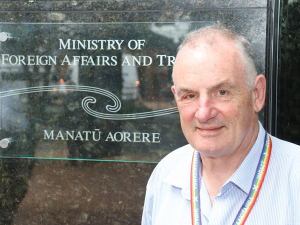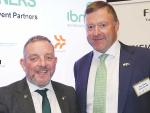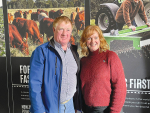For many New Zealanders, Trevor Mallard will be remembered more for some of his misdeeds as a member of Parliament.
And more latterly, for using garden sprinklers and Barry Manilow music to try and rid Parliament grounds of an unruly mob of protestors. But behind some of these outlandish acts is a man who has made a contribution to the country as a member of the House of Representatives for 38 years.
Mallard came from humble beginnings being brought up in Wainuiomata, went to one of the more progressive secondary schools in Wellington, Onslow College, and then on to university where he completed an accounting and economics degree. But having just completed this, he almost instantly decided he didn't want to be an accountant and instead did a teaching qualification, followed by country service in the King Country working in rural education.
"This was one of the things that I regard as a bit of the making of me," he told Rural News. "Just the fact that I was taken from a liberal Wellington, where all my mates thought the same thing, to a rural area where I was playing rugby in a team that had Mongrel Mob members and farmers in it."
Mallard's politicisation began when Norman Kirk came to power in 1972 and a young Mallard helped Labour MP David Shand to win the Wellington Central seas. Shand lost the seat in 1975 when Muldoon came to power, the National candidate Ken Comber beating Shand by about 27 votes, earning the nickname 'Landslide Comber'.
Mallard then became actively involved in the Labour Party and in 1984 won the Hamilton West seat in the David Lange-led landslide. This was the beginning of a parliamentary career which would span 38 years and see him rise through the ranks to take on various ministerial roles.
"A bad day in government is better than good day in opposition because you can make decisions and make a difference to people's lives," Mallard explains.
"Whereas in opposition, while you can talk a lot, actually you can't do that much. The best job was probably as Minister of Education, but another good one was Associate Finance Minister for nine years, when I did a lot of the budget expenditure stuff. I think that was just about as important as education work, but without the portfolio," he says.
The last five years of Mallard's time in Parliament was spent as Speaker of the House - a job he describes as somewhat lonely. But when he indicated that he was looking for new horizons, he talked with the then PM, Jacinda Ardern, and a deal was reached that he would be the next Ambassador to Ireland.
The Dream Job
Ireland is a country that Trevor Mallard knows well and over the years has visited about a dozen times.
He has grandchildren in Galway city, in the west of Ireland, and has many political contacts and friends in Dublin where he's now based. He also has a real sense of Irishness and how the cultures of NZ and the Emerald Isle merge on many fronts. He notes in particular the similarities of Māori and Irish culture in terms of language and social traditions.
Then there is the huge migration of Irish people to NZ, where it is said that one in six Kiwis are of Irish heritage – not to mention the likenesses of our pastoral based economies.
Mallard says Ireland is very important politically for NZ in terms of dealing with the European Union now that an FTA has been agreed. After all, he adds, it’s now the only country in the EU, apart from Malta, which is English speaking.
Mallard says he’s taking on the role with a mixture of trepidation and excitement.
“Firstly, I’ll be finding my feet but also focusing on what benefits that FTA can bring for NZ. It’s not only the pastoral sector but also in a lot of other areas and services like wine and honey,” he told Rural News.
While the EU is still in the process of ratifying the FTA, Mallard says he’ll work behind the scenes to get alongside some of the sceptics of the deal – such as French and Irish farmers – to try and allay any fears they may have. He’ll also work on expanding the agritech sector, which he says is working well, and helping foster Māori business that is making inroads in Ireland.
“I’ll be working to find new business connections,” he explains. “I’ll be pointing out to the farming community in Ireland and the EU that, as pastoral producers of high-quality protein, it’s much better to work together and find solutions to common problems such as climate change, rather than fighting each other.”
Mallard acknowledges the significant collaboration that already exists in the area of agricultural science and will foster the expansion of this. He says, in some areas, Ireland is ahead of NZ but there are other areas – especially in the application of technology – that NZ leads the way.
So how will this somewhat controversial man, who has never shied away from saying and doing what he thinks, transition into the ultra-polite world of diplomacy?
Easy, says Mallard.
“As Speaker of the House, you are speaking for yourself, but as an ambassador, you are speaking for your country and any mistake will reflect on your country,” he explains. “I’ll be just taking a little bit of care about what and how I say things.”
Having said that, Mallard believes the Irish like directness and don’t like to be misled.
“They enjoy having full and frank discussions and they have a sense of humour,” he adds. “They also have very good bullshit detectors,” he says.
However, Mallard’s success as the Ambassador to Ireland may yet be determined by an outside force – namely the All Blacks. He says he has been warned by a close Irish friend that if the AB’s beat Ireland in the upcoming World Cup, friendly diplomatic relations between the two countries could be on the line.
We will all be watching the games with interest to see which side Mallard is supporting – black or green. Surely diplomacy rules over rugby.



















